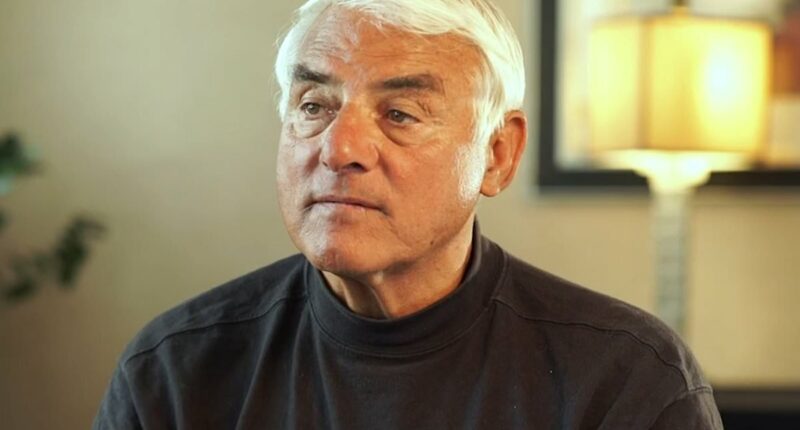Share this @internewscast.com
A prominent psychiatrist, whose influential research is often linked to the rise in autism diagnoses in the US, has harshly criticized President Donald Trump’s warning about Tylenol, labeling it as ‘absolutely moronic.’
At a press briefing on Monday, Trump advised pregnant women against using Tylenol or generic acetaminophen, suggesting it might heighten the likelihood of autism in their offspring.
‘Don’t take Tylenol,’ he said, ‘fight like hell not to take it.’
Dr. Allen Frances, a professor emeritus at Duke University, played a major role in broadening the criteria for autism in the 1990s, which enabled a higher classification of children as autistic than ever before.
In comments to the Daily Mail, Frances described Trump’s statements as ‘weird’ and ‘dangerous,’ cautioning that they might result in misallocation of resources on ‘propaganda research to support a false theory.’
He also expressed his views on X, saying, ‘I previously criticized RFK Jr’s baseless vaccine-autism conspiracy, so I’m well aware of the ignorance these individuals exhibit.’
‘But Trump’s autism comments today were absolutely moronic. And shame on the FDA head, who knows better, for supporting this reckless BS.’
Frances mentioned that although the US reports significantly higher autism rates compared to other Western countries, this discrepancy is due to more inclusive diagnostic standards and a wider definition of autism, rather than being linked to common painkillers or vaccines.

Dr Allen Frances (pictured) blasted President Donald Trump’s claims that Tylenol was causing autism as ‘absolutely moronic’
‘Autism has an extremely loose definition and very fuzzy boundaries to normality and other psychiatric disorders,’ he told the Mail.
About one in 2,000 children in the US had autism in the 1980s, estimates suggest, but today the number is one in 31.
Autism is a neurodevelopmental condition that affects how a person communicates, interacts with others and experiences the world.
In the 1970s, the only people diagnosed with the condition were those who had severe communication difficulties, often struggling to speak and interact with others.
But in 1994, Frances led the team that expanded the definition of autism to include Asperger’s syndrome, a milder cognitive problem that can emerge later in life.
In 2013, building on his team’s work, the definition was loosened yet again to include even milder cases, and autism was redefined as ‘autism spectrum disorder’ – acknowledging the wide range of possible severity.
Autism spectrum disorder includes symptoms such as repetitive movements, avoiding eye contact, not reading social cues, not engaging in certain play as a child and not exhibiting normal developmental characteristics.
Frances said experts expanded the definition to try to catch more children who were falling through the cracks and get them treatment.
But rather than help a few patients, he said it had led to an eruption in cases that had fueled conspiracy theories like the anti-vaccine movement, and now, warnings around acetaminophen.
Speaking to the BBC earlier this year, Frances said: ‘It’s a kind of mea culpa; we had good intentions that led to terrible unintended consequences.
‘I feel very guilty that through our well-meaning but misguided efforts, we’ve contributed to the anti-vax movement.’
He called the links made between vaccines and autism ‘absurd.’
‘I knew the problem was definitional and increased assessment and popularity of diagnosis, not vaccines.’
Frances and his team updated the definition of autism in the Diagnostic and Statistical Manual of Mental Disorders (DSM) – the ‘bible for mental health professionals’ in the US.
In Europe, where rates have also risen but are still much lower, experts use a different definition of the condition.
Trump and his health officials frequently cite a 2024 study as the reason for their warnings.
The paper, from Mount Sinai and Harvard researchers, analyzed data from 46 previous studies carried out across the globe. It found that there was an association between acetaminophen exposure during pregnancy and an increased risk of a child being diagnosed with a neurodevelopmental disorder such as autism.
But the research only found an association, which did not prove that acetaminophen definitely causes autism.
The scientists behind the study have already accused the president of ‘spreading misinformation.’
Dr Brian K Lee, one of the study’s co-authors and a professor of epidemiology at Drexel University, told the Daily Mail: ‘The best science to date indicates that acetaminophen use during pregnancy does not cause autism.
‘While there are several observational studies that have found a statistical association between acetaminophen and autism, association is not causation.
‘In short, the president is spreading misinformation.’

Pictured: Donald Trump at the press conference on Monday where he claimed that taking Tylenol, or acetaminophen, while pregnant could raise the risk of a child developing autism
There are decades of research and a host of other studies that show no increased risk of autism in babies whose mothers took acetaminophen, also the active ingredient in numerous cold and flu drugs, while pregnant.
Other major studies include a 2024 paper by Swedish researchers that analyzed data from more than 2.4 million children that found no heightened risk of autism among children exposed to acetaminophen.
There are also uncertainties over numerous other drugs taken during pregnancy and whether they raise the risk of a child suffering from autism.
Dr Nechama Sorscher, a pediatric neuropsychologist and psychotherapist, told the Daily Mail: ‘Research on acetaminophen and autism does not prove definitive causation. We see similar uncertainty with antiseizure medications, SSRIs, benzodiazepines and even antibiotics.
‘That’s why leaders and scientists have a responsibility to share findings with honesty and context, acknowledging risks, emphasizing what’s not yet proven and giving families clear, balanced information so they can make informed decisions without unnecessary fear.
‘Being pregnant is hard enough without fearmongering.’
In some cases, acetaminophen might even be a necessary medication. Pregnant women may be prescribed acetaminophen to treat high fevers, for example – the illness can be dangerous for both mother and baby.
Dr Jeff Singer, a senior fellow at the Cato Institute in the Department of Health Policy Studies, told the Daily Mail: ‘This is an issue, and it is being looked at by academic and clinical researchers around the world.
‘It is not an unreasonable question to ask: “Does acetaminophen cause autism?”
‘But what I am asking is that they leave the question to the scientists, to the clinical researchers, and stay out of it. We are on it, and we are already taking care of it.’
Officials, including Dr Mehmet Oz, the head of the Center for Medicaid Services, and Vice President JD Vance, have attempted to walk back the statement in recent days, saying that pregnant women should instead ‘consult’ their doctor before taking Tylenol.
A spokeswoman for the manufacturer of Tylenol, Kenvue, said in a statement to the Daily Mail: ‘Acetaminophen is the safest pain reliever option for pregnant women as needed throughout their entire pregnancy.
‘The facts are that over a decade of rigorous research, endorsed by leading medical professionals and global health regulators, confirms there is no credible evidence linking acetaminophen to autism.
‘We stand with the many public health and medical professionals who have reviewed this science and agree.’














